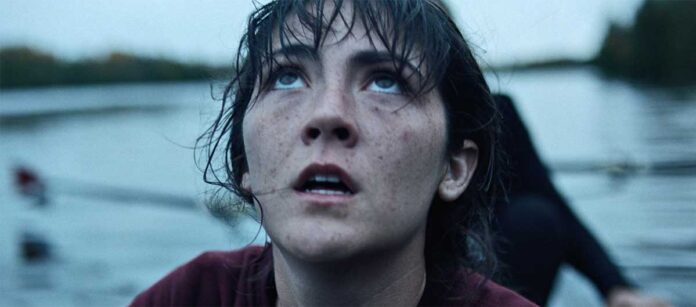“The Novice,” opening December 17, portrays Alex (Isabelle Fuhrman), a lesbian who joins her college rowing team. But far from being an inspirational sports drama, this intense film, written and directed by out gay filmmaker Lauren Hadaway, shows how Alex’s obsession for perfection consumes her. She becomes a rival with her teammate Jamie Brill (Amy Forsyth), and struggles with her schoolwork. She also begins a romantic relationship with her TA, Dani (Dilone). Fuhrman gives a committed performance as this case study in self-destruction.
In a recent zoom interview, Hadaway chatted with PGN about her new film, and how she challenges herself.
“Why rowing?” is a question Coach Peter (Jonathan Cherry) asks the novice girls. Why did you set your film in this sport?
I took my four years of collegiate rowing experience and compressed it down into a year to create this. I was totally obsessed with it. I was going to 20 hours of practice, twice a day, six days a week on top of double majoring and being super active in a lot of clubs and working and interning. I was fucking exhausted, frankly. I thought it would be ripe ground for my own tortured artist film, about the drive and the grit and these external forces.
“The Novice” embodies this idea that queer youth overachieve to prove themselves. Was that your subtext?
I wonder why I’ve been driven to do certain things. Maybe growing up in a small town and not having people to connect with, you live in your head and you find purpose. If you are not in a relationship — because you are closeted, or not aware of your sexuality — you look for intimacy and purpose in other things. I connect with that. And for me, it was finding achievement and accomplishing things.
You shoot the various rowing scenes in different formats. Can you talk about your visual approach to the film?
The visual style has to have intention and be adding something to the story. There is this relationship with Alex and Dani, but there is a relationship between Alex and the boat and the sport that, to me, is the real romantic relationship at the core of this film. I consciously made a rough analogy to a relationship. You have the first attraction, the clunky beginning, the falling in love, the first time making love, and being in love — a blissful row with utter perfection — and inevitably, the relationship turns toxic. Each rowing scene it was where is she on this journey and in this headspace.
What decisions did you make regarding Alex’s relationship with Dani?
It starts contentious, and they have a curiosity and are challenging to each other, which is a draw — an opposites-attract situation. I very intentionally don’t have a moment of Alex questioning her sexuality. I tried to frame [their sex scene] to be this sort of epiphany, a wake-up call that relates to rowing — relax, technique is more important than size and strength, etc. Alex learns this through this encounter. Dani is the only person with whom Alex finds any kind of balance. And that becomes a point of contention. She is someone who doesn’t want to be helped, which comes up in mental health all the time. Dani is very smart and ambitious, and she tries to tell Alex, “I get what you’re doing, and you don’t need to be doing it.” But Alex does not want to hear it.
I like that you get into Alex’s mindset; we hear the voices that speak to her. Her body gets thinner as her determination and self-destruction take their toll on her. Can you talk about her character and how you developed her?
Isabelle had to learn how to row. She gained 10 pounds of muscle, and we talked about how she was dressed — her hair and body language — which feeds into her character. It evolved as the film goes on, I used lighting to mark her change as the film progresses. Alex doesn’t have any dialogue in the first 12 minutes, which is not normal for protagonists. That was very intentional. I wanted her to feel like an enigma, like a creature you observe in a zoo. The audience doesn’t need to connect with her, or understand her, they just need to be curious about her. I unraveled why she is ticking, what is driving her. She’s a dog who sees a squirrel and can’t let go of it to the detriment of her own body and mental health. She goes to greater extremes. It was fun to dive into that. I don’t want there to be a moment for the audience to breathe. I want viewers to feel the anxiety.
She is such an individual, but rowing is a team sport…
You are rhythmically doing a repetitive thing, which plays into the obsessive nature. All you see is ponytail in front of you and you are rowing backwards. It lulls you, and sucks you in. There is a real psychology to it. It is a sport that is as challenging mentally as it is physicality. It’s a great analogy for obsession. It looks deceptively peaceful, but when you are in the boat, the racers are about to throw up.
Can you talk about your work ethic? This is your feature debut. How did you challenge yourself?
I didn’t need to! I finished post-production of this film in my kitchen during the pandemic and working my day job cutting sound on another film while cutting dialogue on my own film. It was extremely demanding. This is my blood, sweat, and tears investment. When I think about what I am going to do next, I ask: Am I willing to cry in a fetal position on the floor over this script? If the answer is no, then I’m not going to do it!
